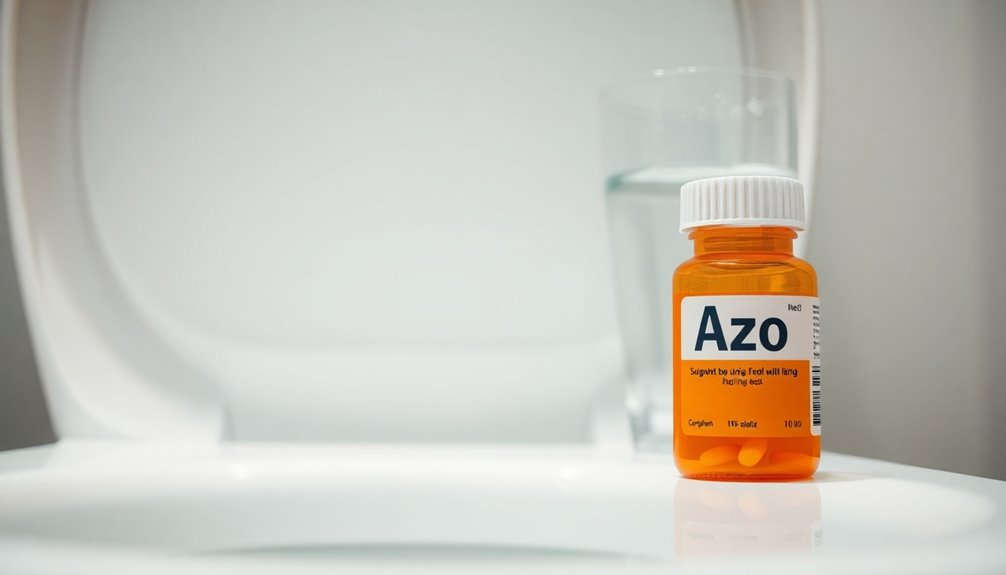Yes, Azo can affect urine tests significantly. When you take Azo, its bright orange color can lead to false positives, especially for nitrite and leukocyte esterase tests, complicating your UTI diagnosis. This means you might face unnecessary extra testing like cultures. Plus, Azo can also skew results for blood and protein tests. If you're using home test kits, the interference can confuse the outcomes. It's crucial to inform your healthcare provider about Azo use so they can adjust their testing methods. Curious about how to get more reliable results? There's more to uncover about this topic.
Key Takeaways
- Azo can cause false positives in urine tests, particularly affecting nitrite and leukocyte esterase results, complicating UTI diagnoses.
- The bright orange/red color of urine from Azo can confuse test interpretations, leading to unreliable results.
- Urine cultures and microscopy are reliable alternatives for accurate testing that remain unaffected by Azo interference.
- Home UTI tests can yield misleading results due to Azo's effects, emphasizing the importance of professional guidance for accurate diagnosis.
- Informing healthcare providers about Azo use is crucial to ensure appropriate treatment and prevent misdiagnosis.
How Azo Interferes With Tests

When using Azo (phenazopyridine) for urinary discomfort, it's essential to be aware of how it can interfere with urine tests. Azo can lead to false positives in urine dipstick tests, particularly affecting the leukocyte esterase and nitrite components.
The bright orange or red color Azo imparts to your urine can confuse the test outcomes, making it less reliable for diagnosing urinary tract infections (UTIs). Given this interference, healthcare providers might skip dipstick tests entirely, opting for urine microscopy or culture instead. Additionally, it's important to note that 12% of women report experiencing bladder infections annually, highlighting the significance of accurate testing.
While Azo doesn't interfere with these methods, it can still affect other urine tests, such as those for kidney function, bilirubin, and sugar levels. This means you should inform lab personnel and doctors about your Azo use to ensure accurate interpretations of your test results.
Additionally, the color change from Azo can alert lab technicians to potential issues, possibly leading to further investigation or sample rejection. Proper sample handling is crucial to avoid contamination and ensure accurate results, especially considering that Azo can complicate the detection of protein in urine.
Understanding these interferences is vital for accurate diagnosis and effective treatment.
Effects on Test Components

Azo's impact on urine tests extends to specific test components, leading to significant inaccuracies. If you're taking Azo (phenazopyridine), be aware that it can interfere with the nitrite test. This medication can turn the nitrite test pink, resulting in a false positive for a urinary tract infection (UTI), which may mislead your doctor.
Moreover, Azo also affects the leukocyte esterase test. The color changes in your urine can cause false results here too, complicating the diagnosis of infections. When these tests yield unreliable results, you might find yourself undergoing additional testing, like urine cultures, to clarify your condition. Azo test strips are not recommended for children due to the lack of sufficient safety and efficacy data in the pediatric population.
While Azo's effect on blood and protein tests is less commonly noted, it still poses risks. Blood in your urine and protein levels can indicate various health issues, and Azo might skew these results, complicating accurate diagnoses.
Ultimately, if you're on Azo, it's crucial to inform your healthcare provider. This way, they can consider these potential interferences and choose appropriate testing strategies to ensure you receive an accurate diagnosis.
Reliable Testing Alternatives

If you're looking for reliable testing alternatives while using Azo, there are several effective options available.
First, consider urine culture and sensitivity tests. These tests accurately grow bacteria from your urine sample, providing clear results regardless of Azo use. Additionally, proper filtration methods can enhance the accuracy of testing by ensuring that contaminants are minimized.
Microscopy is another solid choice, as it checks for white blood cells and bacteria without being affected by Azo. Additionally, using synthetic urine can be a last-resort option for those who want to bypass any potential issues with their own urine sample.
For drug testing, advanced methods like gas chromatography-mass spectrometry (GC-MS) offer precise detection of metabolites and parent drugs, unaffected by any medications you might be taking. These tests significantly reduce false positives, ensuring your results are trustworthy.
Another option is sweat patch testing, which uses patches to detect drug metabolites in your sweat. This method boasts high accuracy and a longer detection window, with each positive result confirmed through liquid chromatography-tandem mass spectrometry (LC/MS/MS).
If you're facing an imminent test, detoxification products like the 5-Day Detox Toxin Rid Kit can help clear substances from your system.
Alternatively, synthetic urine kits provide drug-free samples designed to mimic human urine, though their use may raise legal and ethical concerns.
Home Testing Challenges

Home testing for conditions like urinary tract infections (UTIs) can be fraught with challenges, especially due to the influence of medications like Azo. This medication interferes with the leukocyte esterase component of urine dipstick tests, leading to misleading results.
You might find that Azo causes false positives in the nitrite component, complicating your home diagnosis. Additionally, Azo turns your urine orange, which can skew visual tests, making it hard to interpret the results accurately. At-home drug tests typically provide results within minutes, highlighting the urgency of accurate interpretation.
At-home UTI tests aren't 100% reliable, and the presence of Azo can mask important indicators, making it tough to diagnose a UTI correctly. Remember, not all bacteria that cause UTIs produce nitrites, so you could still get false negatives.
Moreover, the potential for user error, sample contamination, or even manufacturing defects can further compromise the accuracy of your results.
With all these factors in play, it's clear that while home testing may seem convenient, it can lead to significant misinterpretations, especially when medications like Azo are involved.
Always consult a healthcare professional for a more accurate diagnosis and treatment plan.
Clinical Considerations

When considering the use of Azo during urinary assessments, it's crucial to understand its potential impact on test results. This medication can interfere significantly with urine dipstick tests, particularly affecting the leukocyte esterase and nitrite components, leading to false positives. Its dye properties may also compromise readings for blood and ketones. However, this interference doesn't affect microscopy or urine culture results, which remain reliable for diagnosing bladder infections.
If you're taking Azo, it's essential to inform your healthcare provider before undergoing any laboratory tests. Doing so allows lab personnel to interpret your results accurately, especially since Azo can alter outcomes for tests measuring glucose, ketones, kidney function, and bilirubin levels. Additionally, be aware that while Azo is marketed for urinary health, it has no scientific evidence supporting its effectiveness in altering drug test outcomes.
While Azo effectively alleviates symptoms of urinary tract infections, remember that it doesn't treat the infection itself. For those with chronic conditions like lupus or diabetes, be particularly cautious, as Azo may skew test results.
Lastly, keep in mind that Azo should be used for no more than two days unless directed otherwise by a doctor, and be aware of potential staining effects on clothing and contact lenses.
Practical Tips for Patients

For patients taking Azo, being proactive about urine tests can make a significant difference in obtaining accurate results.
First, stop taking Azo at least 12 hours before your urine test. This helps minimize interference with the nitrite and leukocyte esterase portions of the dipstick test, which can lead to false positives.
Always inform your healthcare provider about your Azo use, as it can affect various lab tests, including those for glucose and ketones. Staying hydrated is crucial, so drink plenty of water to help clear Azo from your system. Additionally, testing with AZO Test Strips provides quick results that facilitate timely medical decisions.
If you're using AZO Test Strips, follow the instructions carefully and test in the morning after at least four hours without urinating. If your symptoms persist despite negative results, consider repeating the test with a new strip.
Avoid contaminating your sample by ensuring the genital area is clean before testing.
If you're unsure about the results, sending the urine sample to a lab for culture and sensitivity testing can provide more accurate insights.
Importance of Professional Guidance

Navigating health issues can feel overwhelming, and seeking professional guidance is crucial for accurate diagnosis and effective treatment. When you experience symptoms, it's easy to misdiagnose yourself, especially since many conditions share similar signs.
Healthcare professionals are trained to conduct thorough evaluations, ensuring they identify the root causes of your health concerns. This accuracy is vital because a misdiagnosis can delay proper treatment and lead to negative health consequences. Effective healthcare relies on professional medical advice to ensure the best outcomes.
Medication management is another key aspect of professional guidance. Medications like Azo can interfere with urine test results, potentially leading to false positives. Your healthcare provider can prescribe the right medication, dosage, and timing while monitoring its effects on your body, adjusting treatment plans as necessary.
Moreover, professional care is personalized. Your provider considers your unique medical history and lifestyle, tailoring treatment to fit your specific needs. This personalized approach enhances the effectiveness of your care and promotes optimal health.
Lastly, ongoing preventive care and regular check-ups allow for early detection of potential health issues. By staying proactive about your health, healthcare professionals ensure you receive the best care possible.
Don't hesitate to reach out for the guidance you need.
Frequently Asked Questions
Can Azo Change the Results of Blood Tests?
Azo can potentially change the results of blood tests, particularly those that assess kidney function and bilirubin levels.
Since Azo interacts with various components in the body, it might lead to false positives or negatives in your results.
It's essential you inform your healthcare provider about your Azo use before any blood tests, as this can help avoid misinterpretations and ensure you get accurate diagnoses and appropriate treatment.
How Long Does Azo Stay in the System?
Azo typically stays in your system for about 24 hours. It starts working within an hour, which you'll notice by a change in your urine color.
If you're planning to take a urine test, it's best to stop taking Azo at least 12 hours beforehand to minimize any potential interference.
Is It Safe to Take Azo During Pregnancy?
It's essential to consult your healthcare provider about taking Azo during pregnancy.
While animal studies show no harm, there are no human studies confirming its safety. If your doctor believes the benefits outweigh the risks, they might prescribe it.
Can Azo Cause Any Side Effects?
Yes, Azo can cause side effects. You might experience headaches, dizziness, or an upset stomach.
Nausea and vomiting are also possible. In more serious cases, watch for little or no urinating, swelling, or confusion.
If you notice severe allergic reactions like hives or difficulty breathing, seek medical help immediately.
Always consult your doctor before use, especially if you have conditions like kidney or liver disease, diabetes, or if you're pregnant.
Are There Alternative Remedies for UTI Relief?
For UTI relief, you can try several alternative remedies.
Start by drinking plenty of water to flush out bacteria. Unsweetened cranberry juice may help as well.
Consider increasing your vitamin C intake to acidify your urine. Natural antimicrobials like garlic can also be effective; adding it to your meals or taking supplements could provide benefits.
Lastly, uva ursi is another option, but use it in moderation to avoid potential side effects.
Conclusion
In conclusion, Azo can definitely interfere with urine tests, potentially skewing results and leading to misdiagnosis. It's crucial to communicate with your healthcare provider about any medications you're taking, including over-the-counter options like Azo. While home testing can be convenient, relying solely on it without professional guidance isn't wise. Always prioritize getting accurate results through proper clinical testing, ensuring you receive the right diagnosis and treatment for your health concerns. Stay informed and proactive about your health!









